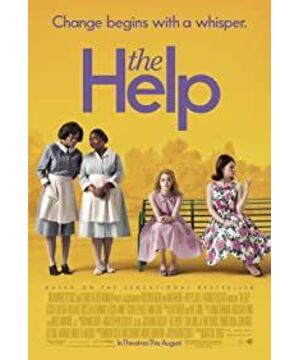I recently watched two comedy stories about a time when black people were severely discriminated against. One is "Help" and the other is "Hidden Figures", both of which show many details of how black people were discriminated against and oppressed at that time. "Help" describes a relatively earlier time, when the awareness of black equality was awakened, and more and more people, led by Martin Luther King, were involved in the struggle. But the struggle at that time was very dangerous. In the past, black people were slaves, living like cattle, and they were the property of white people, while white people lived a life of leisure and freedom by squeezing and exploiting the labor force of black people as a matter of course. The concept of equality of skin color, which is so uncontroversial in our eyes now, in that era, because it touched the interests of the white class, it must have been strongly suppressed, and of course bloodshed was not less. This danger, like every revolution in world history, has countless stories of sacrifice behind it. It can be said that the wheels of human civilization are driven by countless flesh and blood.
Although the comedy element of this film has greatly diluted the heaviness of this history, I can still feel the depression of the protagonist, the black servant Abby Leon. Even the victory of the black servant described at the end of the film is like what I saw in a long night. A little light.
Elibeen began working as a helper in a white family when he was a teenager, helping to bring many children to the white family, managing food, drink, housing, and transportation, as if he were the mother of the white children, but his own son was not able to take care of it. But even so, her son has grown up, a 24-year-old educated and excellent son, and the good years are about to begin. Although Elibeen has a miserable fate, because of this son, he has that little sweetness and hope. However, her son was run over unprovoked by a white truck driver and left casually at the gate of a hospital. There is no legal sanction, no judicial redress, her lifelong sustenance, the treasure on the top of her heart, was treated as grass by others and died, no one looked at it and shed a tear, as if it was just a stray dog that was run over to death , as if it never existed. This kind of pain and resentment is huge, and this kind of huge pain can only be internalized by Eli Bean, and the powerful emotions swallowed her up, causing her depression. Even if the white Skeeter wanted to write a book that reflected the current situation of the black maids and called for human rights for the black maids, Eli Bean refused at first because, at the time, it was risking his life.
The fate of Elibeen is just a microcosm of the fate of many black people at that time. Some people endured in despair all their lives, some people stood up and fought and sacrificed, and some people fought and survived until the dawn after the long night.
I felt that intense depression and pain when I looked at Eli Bean. I asked myself, if it were me, would I choose to stand up and help Skeeter? But it is very likely that he will be the one who sacrificed in the long night. A help that seems light and airy in the movie, if you put yourself in it, you will understand how much struggle, how fearful and how brave it is. And no matter how I think about it, I will never know whether I am the one who stands up or the one who endures it until I look at it.
Avery Bean eventually made the choice to help Skeeter, so she became Avery Bean herself. As at the end of the film, what I felt was not heroism, but a black servant's response to fate. Her life was not good, it could even be said to be miserable. She has no right to choose her own life, but what she can choose is how to respond to it. Suffering has no meaning, its existence only provides a mirror, allowing us to face the issues of life directly. Whatever we choose to respond to, we have written the meaning of life, defined ourselves, and made judgments. Even if we can write a lot of words to explain and give a lot of speeches to show, we can think we can see through and see everything clearly. But only when we truly face the choices at each fork in life are we truly shaping our true self and life.
I gradually realized that if you have never experienced pain, how can you experience happiness? If there are no hard choices, how can we live out our beliefs? Without sacrifice and forbearance, how do you know what is the love of life? If you don't give up and lose, how do you know what is more important to you?
It turns out that the meaning of life and the existence of self are not explained with words, nor are they thought out with the head. It is shaped by your words and deeds bit by bit. It's between you choosing A and giving up on B, believing in C or sticking to D.
Therefore, everyone, no matter great or ordinary, rough or smooth, can and is creating his own and only his own life.
View more about The Help reviews






